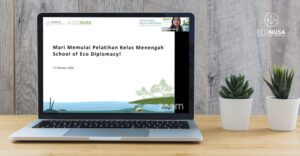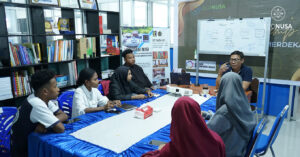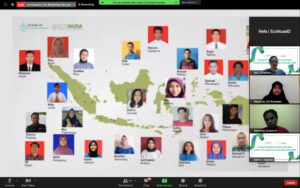
EcoNusa Maluku Expedition did not only bring solidarity mission through health support for Covid-19 mitigation and farming supports for food resilience for the community to cope the pandemic. Above all, the expedition also held beach cleanup and underwater cleanup to express the concerns about sea ecosystem health in Maluku.
Along the trip to the islands visited by the expedition team, marine debris were floating on the sea and beach in Maluku. With the local community, youngsters group and green activists, the expedition team initiated beach cleanup on the coastal and water areas in Maluku. Two members of Slank music group, Akhadi Wira Satriaji or Kaka and Mohammad Ridwan Hafiedz or Ridho, took parts in this bustle.
In Haruku water, Maluku Tengah Regency, Maluku Province, the expedition team cleaned marine debris on the 7-meter-deep water surrounding the coral transplantation. Ridho dived on that spot. Meanwhile, beach cleanup was done in some hamlets such as Ameth Village in Nusalaut District, and Pulau Rhun and Ay in Banda District, Maluku Tengah Regency.
In Ameth, Kaka and Ridho strolled along the 1-kilometer beach and collected more than 10 big sacks of many kinds of waste. It ranges from electronic waste, cellular phone, beverage plastic wrap, denim, plastic wire, bottle debris and underwear.
Sorting Out Waste Reducing Marine Debris
Kaka said that plastic waste phenomena appears to be unavoidable. All products in Indonesia usually use plastic packaging such as bottled drink, instant noodle and the like. So, what to do now is delivering knowledge to the people on how to sort out waste properly.
On the beach cleanup at Pulau Rhun, the sacks for packing debris from the beach have been labelled to categorize the sack for plastic and organic waste.
Upon his observation during the cleanup, Kaka said that the plastic waste he found along the beach or water in Maluku is on normal category. He suspected that the wastes were not littered by the local villagers but flown through the stream from somewhere else. It made sense noting the fact that nearly every village has at least only two stalls that sell products with plastic wraps.
“Maluku has less waste. It is different from the one at the northern Flores. Even within one-kilometer expanse, there was found 10 pampers. So, beach cleanup should be promoted to local communities. The awareness of waste should be taught from early childhood. At least, from 100 children (who care about waste), there would be 10 who is idealistic,” Kaka said.
Community awareness required
As to Ridho, waste remains annoying problem. Many people organize ceremonial event on waste cleanup, but it fails to sustain. Today is clean, but tomorrow dirt comes again. Besides, typically people tend to litter waste carelessly. Such a condition needs our action to build public awareness so as to care more about plastic waste as it dangers sea biota.

”The most waste type during the beach cleanup is pampers. Community should have had their own awareness. Beach and sea cleanup must not be done once but should be continuously exercised to raise community awareness,” Ridho said.
Diving into 25-meter deep in Pulau Hatta, Ridho was shocked by the bomb. “At Pulau Hatta, when we dived into 25-meter deep, bomb all of sudden shocked me. That was once I heard bomb, despite the faraway sound,” said Ridho.
As to him, the community might exploit sea, but they should be wise and proper. Using bomb or poison jeopardize sea ecosystem that serves as the source of the locals’ livelihood.
Editor: V. Arnila Wulandani & Leo Wahyudi




